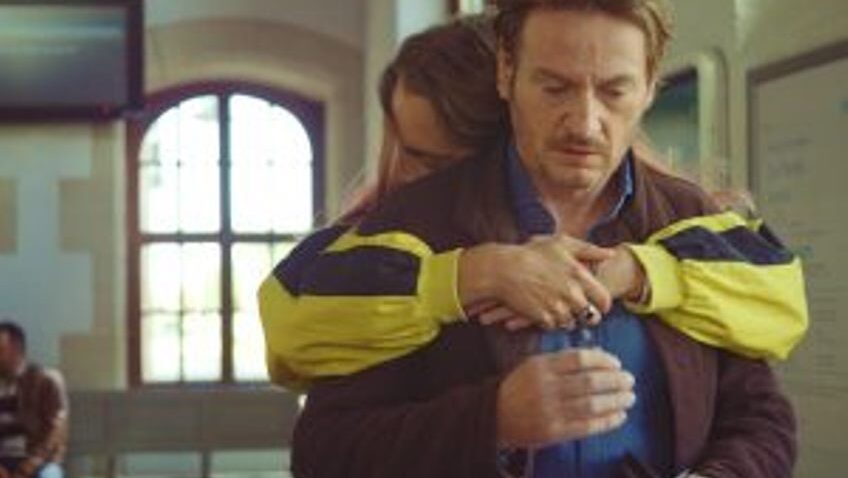Joyce Glasser reviews Lola and the Sea (December 17, 2021) Cert 15, 91 mins.
Belgium writer-director Laurent Micheli’s (Even Lovers Get the Blues) second feature, Lola and the Sea is not only the best transgender film since Sebastian Lélio’s 2018, A Fantastic Woman, but, like that Academy Award winning film, features a charismatic transgender woman in her debut role. If Daniela Vega Hernández played a nightclub singer in her thirties, Mya Bollaers’ eponymous Lola is a skateboarding teenager living in a hostel with more than her fair share of growing pains.
The road trip premise might be a little contrived, but everything else feels like it was written from real life, while Benoit Magimel’s (Little White Lies, The Piano Teacher) touching performance as the angry, uncomprehending, frustrated and grieving widowed dad, is a perfect foil for Lola’s provocative if deceptive nonchalance.
Lola, with long brown hair half dyed pink, is estranged from her father, living in the city, in a hostel with her best friend Samir (Sami Outalbali). She is studying for a degree and preoccupied with her life changing gender reassignment.

Lola is in a good place at last, thanks to the support of her mother and has a date for her first gender reassignment operation. All that changes, when Lola is notified, too late to get to the funeral, that her mother has died. Lola has to borrow money for the train to her parent’s home. In shock and visibly grieving, her father, Phillipe (Magimel), berates Lola for missing the funeral and showing up underdressed.
Lola acts out, smashing the window of her father’s shop after stealing the urn containing her mother’s ashes and returning to the hostel. Outraged, Phillipe goes after the urn, and the two continue arguing and trying to claim the symbolic ashes. Finally, Phillipe proposes they make peace long enough to fulfil the mother’s wish to be buried by the sea in a spot where she was happy.
Lola agrees, displaying attitude to offend her father, such as stealing snacks at a petrol station, while Phillipe takes out his anger on his son, Lionel, in petty ways blaming him for the irreversible idea of becoming a girl when it could be a phase.
The two are also divided by language, and this is one of the few times in which Belgium’s Flemish/French divide takes on a personal and political role (as does the transgender issue) in a film. Lola speaks Flemish, her mother’s language, whereas her father never learned it and is left out of conversations, particularly when they stop at a hotel with hourly rates on the motorway.

Gradually over the course of the journey the two start to talk. Before our eyes, the layers of each character are slowly peeled off, leaving no right and wrong, just hugely different perspectives. It is the gradual, organic and entirely believable way in which the grieving father and daughter gravitate toward acceptance that makes the film gripping and emotionally affecting.
Lola learns that her father was forced to abandon his dream job to take over his father’s hardware business when his girlfriend became pregnant with Lola. That he has never mentioned this before shows that he is not blaming Lola – he accepted fatherhood and the responsibilities of a family. Given that the dream job is a gym instructor, there is a clear notion that this sacrifice makes his disappointment at Lionel’s gender reassignment all the more painful.
Philippe is stunned to learn that his wife was saving money toward the operation that he cannot comprehend. He tries to dissuade Lola, pointing out the physical pain of the operations and medicine, while Lola explains it is nothing compared to psychological torment, she has lived with all her life.
In judiciously sparing, short flashbacks, we learn that Lionel’s transition was not arbitrary or part of a rebellious reaction. This is so well done that, along with watching Lionel/Lola, with her gruff voice, tall height and hairless, but still slightly masculine face, we start to share her longing to escape a body that was kicked and bruised for being someone else’s.
Bollaers is terrific in helping us feel, rather than just watch, the pain and relief of saying goodbye to that difficult childhood on the beach where her mother had such wonderful memories.
The French title, Lola vers La Mer (vers meaning towards) suggests a journey toward acceptance and self-realisation, but it does not translate as such and the “‘and” must suffice. Whatever the title, the film is not just a story about a transgender family in crisis. It is more universal, exploring the perpetual generational divide, where parents, entrenched with assumptions and misunderstandings, hurt and blame on both sides, lose touch with their teenage children.
This is a spoiler, so do not read on, but it is too tempting to pay tribute to the best shot of the film. Phillipe and Lola separate in the train station with an awkward, formal goodbye. They may never see one another again. And then in an inspired idea, whether initiating from the actors, or Micheli, a spontaneous but unsentimental gesture turns into a ten-second-long climax, guaranteed to melt your heart.




